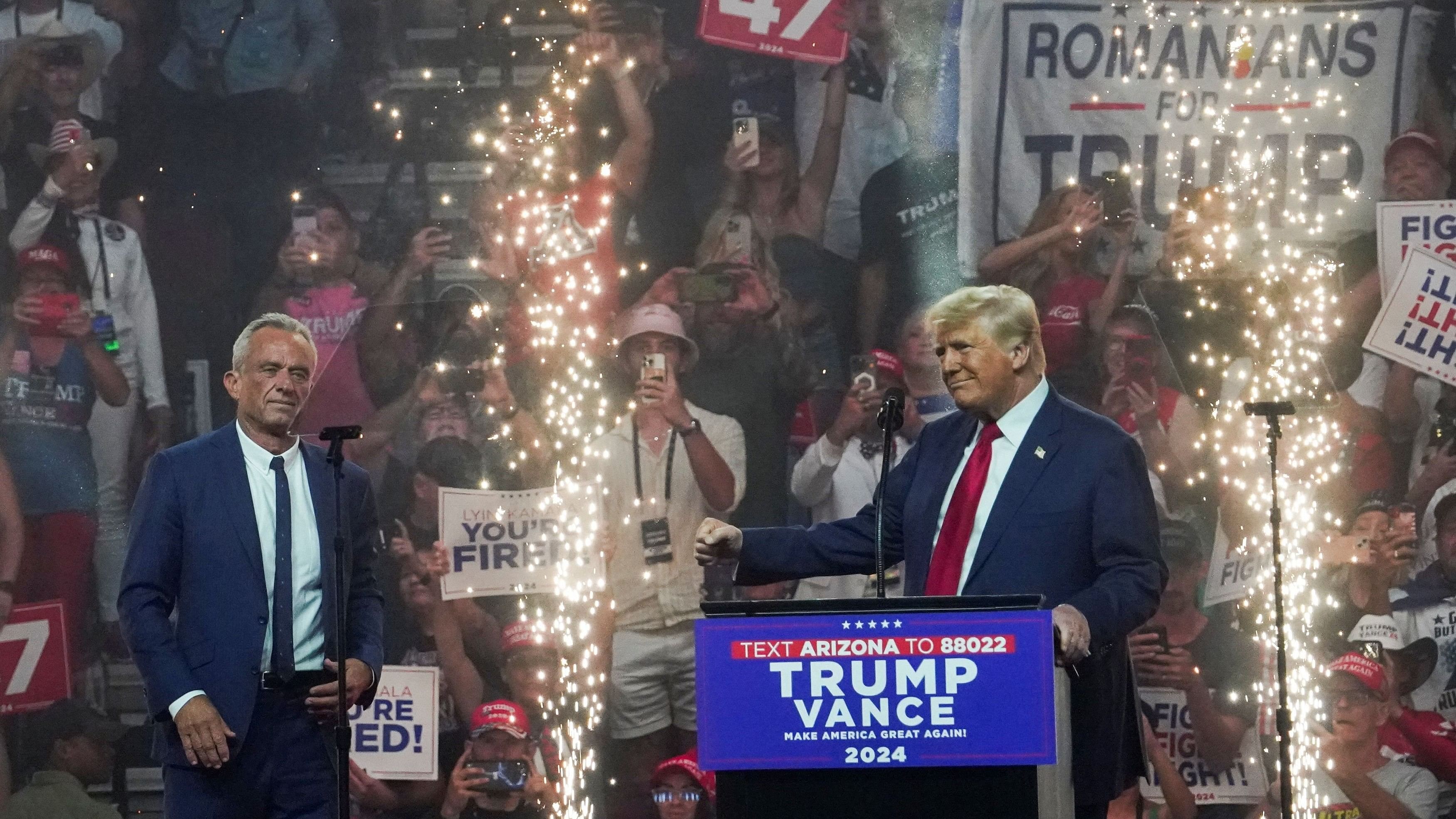
Republican presidential nominee and former U.S. President Donald Trump speaks during a rally as former independent presidential candidate Robert F. Kennedy Jr. looks on in Glendale, Arizona.
Credit: Reuters photo
Robert F. Kennedy Jr. threw his support behind former President Donald Trump on Friday after suspending his troubled independent campaign for president, saying he was withdrawing his name from the ballot in battleground states.
He announced his plans in a speech in Phoenix that also castigated the mainstream media and accused the Democratic Party of "abandoning democracy" and engaging in "continued legal warfare" against him and Trump.
Campaigning in Las Vegas, Trump expressed delight about Kennedy's decision. "That's big," he said. "He's a great guy, respected by everybody."
Trump was expected at an Arizona rally later Friday, and his campaign had told supporters to expect a "special guest."
Kennedy had been in behind-the-scenes talks with the Trump team for weeks about whether he would be willing to suspend his campaign and endorse the former president. Those talks were brokered in part by Donald Trump Jr., Tucker Carlson and Omeed Malik, a businessperson who has supported both candidates, according to two people familiar with the discussions. Donald Trump Jr., in particular, was concerned that Kennedy was drawing support from his father.
Kennedy said that his decision to back the former president would be a "difficult sacrifice for my wife and children," but that he felt compelled to help Trump over support for policy positions he holds dear, including diminishing America's military presence overseas and an overhaul of the country's public health system.
Kennedy's wife, actress Cheryl Hines, has privately expressed reservations about the possibility of him joining forces with Trump, two people familiar with Kennedy said.
Kennedy, 70, the scion of a Democratic political dynasty, ran one of the more unconventional and persistent third-party bids in modern American political history, combining populist economic rhetoric, isolationist foreign policy leanings and government skepticism. He found a base of support among Kennedy-curious independent voters and disaffected Democrats and Republicans.
He began his presidential campaign last year as a Democrat, seeking to challenge President Joe Biden for the nomination. But when he found his path there blocked -- which he blamed on the Democratic Party -- he embarked on an independent campaign that unnerved both major parties, as allies of both Biden and Trump feared he could siphon support from their candidate.
Five of Kennedy's siblings released a statement on Instagram on Friday afternoon, saying that his decision to endorse Trump "is a betrayal of the values that our father and our family hold most dear." His siblings, who have publicly disavowed his campaign since last year, concluded their statement: "It is a sad ending to a sad story."
Despite a common narrative in recent days that Kennedy's continued presence in the race was pulling support from Trump, a New York Times analysis found that was not consistently true. In some recent high-quality polls, he was found to be drawing more votes from Vice President Kamala Harris, the Democratic nominee.
In a statement Friday afternoon, Harris' campaign encouraged supporters of Kennedy to instead support her. "Even if we do not agree on every issue, Kamala Harris knows there is more that unites us than divides us: respect for our rights, public safety, protecting our freedoms, and opportunity for all," the statement said.
In recent months, Kennedy's campaign had become almost singularly focused on ballot access: As an independent presidential candidate, he had to get on each state's ballot separately, which required hundreds of thousands of signatures and tens of millions of dollars.
The effort was largely bankrolled by his running mate, Nicole Shanahan, a wealthy Silicon Valley investor who was once married to Sergey Brin, a co-founder of Google, and whose arrival on the ticket in late March brought an immediate and much-needed cash infusion. To date, she has put more than $14 million into the campaign, campaign finance records show.
Through the spring and summer, as Kennedy began to get on state ballots, his poll numbers, once in the double digits, began to soften -- a trend that is often seen among third-party and independent candidates as the general election approaches. By the end of August, polls put him at around 5% nationwide. And his campaign was running out of money, campaign finance filings showed.
An environmental lawyer, Kennedy has become better known over the past two decades as a prominent opponent of vaccine mandates, promoting widely refuted claims that childhood vaccinations cause autism and railing against what he called the "corporate capture" of the federal government by pharmaceutical companies.
On the campaign trail, he opposed U.S. aid to Ukraine, supported Israel's war in the Gaza Strip and argued for sealing the southern border. He changed his position on abortion several times, ultimately landing on restrictions tied to fetal viability.
He eagerly claimed the mantle of his family legacy, often talking about his father, Robert F. Kennedy, and uncle John F. Kennedy, even as his own family members disavowed his candidacy.
In his speech Friday, Kennedy implied that Trump had offered him a role in his second administration, dealing with health care and food and drug policy. "We're going to reform the entire food system," he said.
Kennedy spent much of the speech detailing his concerns about the high rates of chronic diseases in America, a constant theme of his campaign, which he blames on environmental factors, prescription medications and processed food. He cast himself as a freedom fighter against a broken democratic process and as a public health advocate.